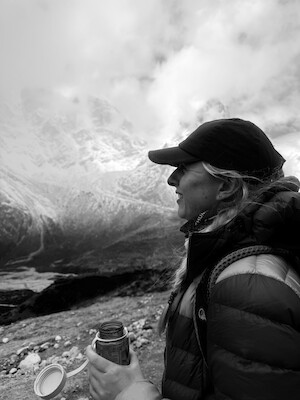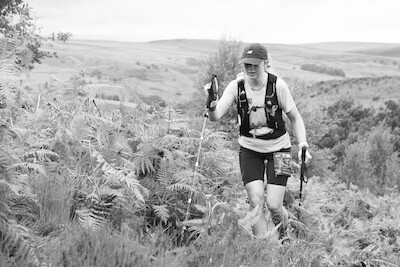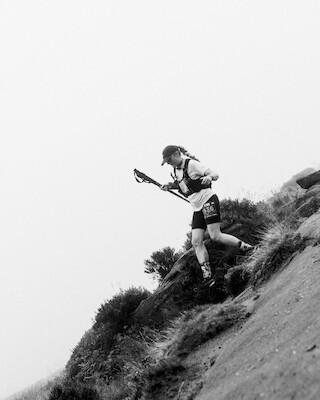Beyond the Summit: Why Endurance is as Mental as it is Physical
 Rowena Rowberry is a nurse, lecturer, wannabe mountain goat and endurance enthusiast. Having climbed 4 of the ‘seven summits’ in 18- months including Mount Everest, she reflects on the psychological impacts extreme challenges presents.
Rowena Rowberry is a nurse, lecturer, wannabe mountain goat and endurance enthusiast. Having climbed 4 of the ‘seven summits’ in 18- months including Mount Everest, she reflects on the psychological impacts extreme challenges presents.
We spend hours prepping our bodies in the gym, out on the trails or in the hills. Some may invest in a coach or personal trainer. We fuel our bodies, pre, post and during our workouts. We research and invest in the kit or equipment required.
It could be assumed that by spending so much time and effort in the preparation for an event or expedition, that we are also mentally preparing for the task ahead. It takes a lot of mental grit to head out and train at ungodly hours, facing all weathers and often for hours at a time.
Physically, we’re preparing for potential of developing blisters, macerated feet, chafing and the odd accidental trip or slip (I’ve had my fair share). Inevitably, we’re expecting tired, aching, swollen muscles, possible gastric upset as we navigate adequate hydration and fuelling and the certainty of physical fatigue.
Ultra runners, or any endurance athletes have all probably been asked by friends or family – how on earth do you do keep going for hours? I know I’ve been asked this question many times. For me, training for these challenges, and taking part in them gifts me with ultimate mindfulness. That ultimate experience of feeling ‘in the zone’, where, especially at high altitudes, my only thought is literally, ‘one foot in front of the other, and remember to breathe’.
Often, it’s this sustained focus and mindset that enables the body to accomplish such remarkable feats. And then comes the culmination – the summit, the finish line – sometimes accompanied by euphoria, or a sense of empowerment and accomplishment. For some, this may be short-lived, for others (like me) those feelings, although expected, we may never experience.
For some, this may be short-lived, for others (like me) those feelings, although expected and anticipated may never come.
We are so good at thinking about our physical health post event, considering how we’re going to refuel to aid recovery, considering how we are going to stretch out our tired and weary muscles, maybe booking in a sports massage, perhaps even venturing on a recovery run. But little thought is ever paid to the psychological side of things. The physical aspects of challenges like these are widely discussed, however the psychological effects are often misunderstood, or under-represented. It's easy to overlook the impact that sleep deprivation, navigating extreme weathers and terrains, dehydration and episodes of fearfulness and uncertainty has on the mind and body. So, its no wonder that there is this phenomenon of post-event psychological ‘crashes’ or depletion.
During the build up to an event or expedition, your mind is constantly focusing on the task ahead. Checking the weather, the route, packing and repacking kit, ensuring the training and fuelling regime is sufficient. Suddenly, post event – this is all gone, and we are left with an empty space.
After I returned from Kilimanjaro, my first ever expedition in 2024, I suddenly and unexpectedly developed the post-summit blues. My training regime and daily routine had no purpose. It almost felt like an identity crisis – I had invested so much physical and psychological effort into this expedition, that now it was over, I had an overwhelming sense of ‘what now?’.
 I had no plans for any future climbs or events, and I found reintegrating into ‘normal’ life quite challenging. Gradually, I set my sights on starting to train for my first ultramarathon and considered undertaking more high-altitude climbs, which gave me a new sense of direction.
I had no plans for any future climbs or events, and I found reintegrating into ‘normal’ life quite challenging. Gradually, I set my sights on starting to train for my first ultramarathon and considered undertaking more high-altitude climbs, which gave me a new sense of direction.
Everest, however, was a different beast. It’s in that down time that I really delved into the memories about the vulnerabilities and sheer dangers faced during that climb. There’s no way of preparing your mind for something like that. No amount of preparation would equip you well enough with the realities of your life hanging on a knife edge. The ability to put your full trust in your sherpas. The consideration for your team-mates, hoping that they too make it off the mountain safe and unscathed. Having spent so long in survival mode and experiencing physical exhaustion made the psychological processing of this expedition a more challenging experience than I had anticipated.
I’m almost three months post-summiting Everest, and only now am I able to override those thoughts with a sense of pride in the fact that I had an uneventful and successful expedition, and sheer gratitude to the entire team around me, and to the mountain herself for keeping me safe.
Four high altitude mountains and three ultra-marathons down, and I am now better at managing those post-event blues – I now know to expect them and embrace that feeling, but to also put in strategies to help the process along.
What I found helps me is to always have that next goal in mind. Better still, get those events or expeditions booked in as soon as possible. I thrive on routine, so having the next challenge on the horizon gives me that drive and continued sense of purpose.
 However, it’s so important to emphasise the vital element of psychological recovery. Allowing the mind to rest in turn allows the body to rest. Internalising that thought process that it is ok to take some time to recoup and embrace some down time both physically and psychologically. Permitting time to recover and reflect is vital, and a skill I hone in on from my career in nursing, and it’s only now that I understand the benefits to applying it to my life outside of work.
However, it’s so important to emphasise the vital element of psychological recovery. Allowing the mind to rest in turn allows the body to rest. Internalising that thought process that it is ok to take some time to recoup and embrace some down time both physically and psychologically. Permitting time to recover and reflect is vital, and a skill I hone in on from my career in nursing, and it’s only now that I understand the benefits to applying it to my life outside of work.
Talking about the event is helpful, the conversations you have with a fellow runner, climber or coach will be so different to those with friends or family who haven’t been through something like this. But it’s helpful to do both, and each will give a different perspective.
Ultimately, undertaking challenging events such as these impacts us in a multitude of ways. But it’s so important to recognise and embrace the need for recuperation, and that psychological and physical recovery should be prioritised equally.
